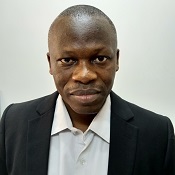 Camilius Sanga is a Professor from Sokoine University of Agriculture (SUA), Tanzania. He is currently the Director of the Sokoine National Agricultural Library (SNAL). Prof Sanga holds a PhD in Computer Science from the University of the Western Cape, South Africa. He also holds MSc. Computer Science and BSc. in Computer Science from Osmania University and University of Dar es Salaam respectively. His research interest is in the area of Information and Communication Technology for Development (ICT4D).
Camilius Sanga is a Professor from Sokoine University of Agriculture (SUA), Tanzania. He is currently the Director of the Sokoine National Agricultural Library (SNAL). Prof Sanga holds a PhD in Computer Science from the University of the Western Cape, South Africa. He also holds MSc. Computer Science and BSc. in Computer Science from Osmania University and University of Dar es Salaam respectively. His research interest is in the area of Information and Communication Technology for Development (ICT4D).
Prof Sanga has published papers in a number of international journals. Also, he has presented papers in local and international conferences. Furthermore, he has co-authored more than two books as well as book chapters. Some of the research projects in which he has been involved are: Development of Monitoring and Evaluation system for Projects under Enhancing Pro-poor Innovations in Natural Resources and Agricultural Value-chains (EPINAV) at SUA, and Farmer Voice Radio (FVR) Project - Building a radio-based, impact-driven small farmer extension service system. Recently, he was an assistant project leader for the research titled “The role of mobile phones towards improving coverage of agricultural extension services: A case study of the maize value chain”. He was also the project leader in the e-learning component in the Danida funded Building Stronger Universities (BSU) project titled E-Learning and Problem Based Learning project at SUA, Morogoro, Tanzania. He has also served as Head of the Department of Informatics (2011-2017).
Currently, he is coordinating a project at SUA tilted 'Enhancing Entrepreneurship, Innovation and Sustainability in Higher Education in Africa (EEISHEA)'. Furthermore, he is co-investigator of the following projects: Facilitating multi-stakeholder partnership to foster sustainable shark fisheries in Tanzania and FOOD and Local, Agricultural, and Nutritional Diversity (FOODLAND project). Lastly, he is a member of a project, InnovAfrica: Innovations in Technology, Extension and Institutional Approaches towards Sustainable Agri-Food Systems to Promote Food and Nutrition Security in Africa.
Prof Sanga is involved in teaching undergraduate courses. These courses includes: CIT100 – Computer applications, INF201 – Human-Computer Interaction, INF300 – Information System Analysis and Design, INF 301: Software Engineering, INF 302 – Database Implementation and Management, 309 – IT security and INF 210 – Research methodology for computing and information management.
You can find his publications on: Google Scholar

